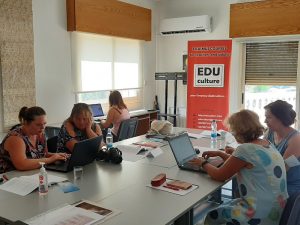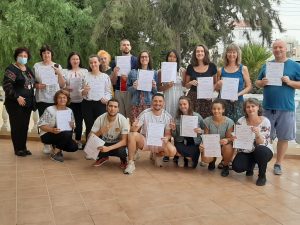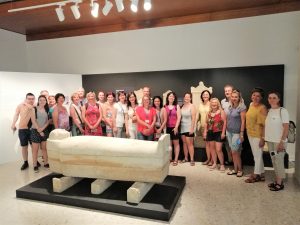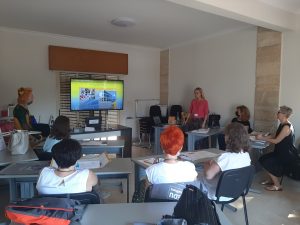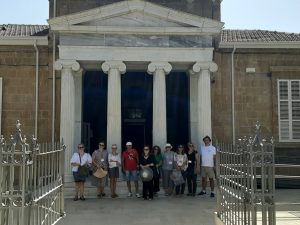EVALUATION AND ASSESSMENT IN PRIMARY & SECONDARY EDUCATION/ LIMASSOL (6-day/ 7-day course) Limassol
Performance in schools is increasingly judged on the basis of effective learning outcomes. Information is critical to knowing whether the school system is delivering good performance and to providing feedback for improvement in student outcomes.
Assessment and evaluation play an important role in the teaching and learning process. They are conducted continuously throughout the year and help analyze students' learning and understanding where they are lagging behind. This can help teachers identify where they need extra help and support in different subjects. Curriculum subjects cannot be taught effectively without assessing student knowledge. There are various assessment and evaluation methods depending on the needs and abilities of the students that a teacher can use.
This course is a 6-day course and aims to provide participants with the theoretical background for evaluation and assessment as well as practical suggestions for data collection, selection of appropriate methodology and the use of reliable assessment tools. There is also the possibility to extent the course to a 7-day.
The cost for 6-day course is 480 euro and for 7-day course is 560 euro. It includes course fees, course material, entrance to museums and tours.
Objectives
During the course, participants will:
• examine the role, objectives and benefits of evaluation and assessment
• study functions and general steps of evaluation
• explore the key competences and basic skills that are important to access
• explore qualitative evaluation methods
• study ICT tools for evaluation and assessment
• explore quantitative assessment methods
• discuss the role of feedback
• examine different types of assessment
• explore computer-based assessment methods
• discuss the criteria for choosing assessment tools and techniques
• study the characteristics of a good assessment
• get informed about benchmarking
• get acquainted with the Cypriot history, culture and hospitality
Methodology
The working methods that are used are highly practical and participatory. The experiential method is used to encourage the search for contemporary pedagogical theories and teaching approaches. The hands-on approach is used to examine real examples, case studies, surveys and simulations. The group activities foster mutual learning, cooperation and collaboration between participants. The discussions encourage sharing ideas, intercultural dialogue and the exchange of good practices between the participants. Social, networking and cultural activities give participants the opportunity to establish professional cooperation and links with teachers, staff, schools and organisations in Europe. At the end of the course, participants fill in an e-questionnaire for evaluation.
Preparation
After confirming registration, participants will be informed about the details of the course (arrival, daily programme etc.). Participants will be able to introduce themselves and bring a few examples of evaluation and assessment that they use in teaching.
Course schedule
DAY 1
• Dimensions of Evaluation
• Activities for team building
• What key competencies to evaluate?
• History of Evaluation
• Functions of Evaluation
• General steps
DAY 2
• ICT Tools for Evaluation
• Visit to Limassol Old city center, Carob Mill Museum, Medieval Castle & Museum and other monuments.
• Doing activities in the city center.
• Data collection for the group work.
DAY 3
• Qualitative Evaluation Methods
- Open- ended questions
- Observations
- Interviews
- Focus groups
- Written documents
- Projects
- Portfolio
DAY 4
• Assessment
• Educational Assessment
• Assessment types
• Formative & summative assessments
• ICT Tools for Formative Assessment
• Multiple-choice questions
• The role of feedback
• Quantitative Assessment methods
- Quiz
- Questionnaires
- Tests -Exams
- Surveys
DAY 5
• Computer-Based Assessment Methods
- Adaptive Assessments
- Simulations
- Web- Based Educational Games
- Ε-portfolio
- E- Questionnaire
- E- Quiz
• Designing assessments
• Choosing Assessment Tools and Techniques
• Where to look for inspiration
• Book: 50 CATs (Classroom Assessment Techniques).
DAY 6
• Benchmarking
• Artifiial Intelligence and Assessment
• Participants complete the group work, presentation of group work
• Review of the course, certificates.
DAY 7 (optional)
TOUR TO PAPHOS TOWN
It includes a tour with 5-stops (9:00 am- 5:00 pm)
• Tomb of the kings
• Catacomb of Agia Solomoni
• Paphos Archaeological Park with Roman mosaics
• Paphos Medieval Castle and port
• Petra tou Romiou (birthplace of Aphrodite).
Course fees
480 euro (6-day) & 560 euro (7-day)
Sessions
• 03.02.2024 - 08.02.2024
• 06.04.2024 - 11.04.2024
• 25.05.2024 - 30.05.2024
• 29.06.2024 - 04.07.2024
• 27.07.2024 - 01.08.2024
• 19.10.2024 - 24.10.2024
• 01.02.2025 – 06.02.2025
• 29.03.2025 - 03.04.2025
• 24.05.2025 - 29.05.2025
• 05.07.2025 - 10.07.2025
• 02.08.2025 - 07.08.2025
• 01.11.2025 - 06.11.2025
Register here




